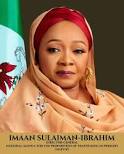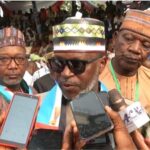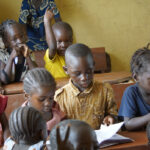In 2019, Nigeria pledged to the Global Refugees Forum to include matters of refugees, Internally displaced Persons (IDPs) and their host communities in the national development plans and strengthening of the country’s protection capacity, ensuring availability and access to durable solutions for refugees and IDPs.
Sustaining Nigeria’s role in regional and sub-regional efforts in adjusting the root causes of displacement and Concerned Persons of Interest, was also included in the plan.
As party to the 1951 United Nations (Geneva) convention relating to the status of refugees and its 1967 protocol, Nigeria joined the global community in December 2018. in order to operationalize the pledges, the country produced implementation road map, which was approved by high level stakeholders’ meeting on 30th November, 2021, to which we are committed.
Nigeria has already made significant progress in terms of localizing and operationalizing the programme on migration, starting from a favourable asylum policy, land provision for refugees/IDPs/returnees, and inclusion in strengthened national education, health and water system to assist displaced women, men and children and the affected host communities.
In furtherance of its pledge, it invested in inclusion, protection capacity and durable solutions, aligning with the national development agenda and the Sustainable Development Goals (SDGs). The National Commission for Refugees, Migrants and Internally Displaced Persons (NCFRMI) under Hon. Imaan Sulaiman-Ibrahim has domesticated these policies and programmes to effectively implement, initiate and facilitate constructive dialogue on migration, map-out sustainable strategies for migration activities as well as promote resilient migration governance in Nigeria.
The NCFRMI is partnering and collaborating with CSOs, NGOs, CBOs and faith based organizations for migration development with the support of International Organization for Migration (IOM) and other international partners to bring development to the grassroots and concerned persons, as the civil societies organizations are key partners in leveraging the Nigerian migration governance structure put in place by the dynamic leadership to aid policy formulation and implementation, and have continuously advocated for the proactive leadership shown by the Federal Commissioner who has remained a rallying factor for various humanitarian partners in the country.
Peering into the extra-ordinary achievements of NCFRMI, Guild of Civil Societies and Media Executives for Equity, Justice) in Nigeria, (GOCMEJ) President, Omoba Kenneth Aigbegbele posited that migration governance in Nigeria has been on a continuous improvement basis since the expansion of the commission’s mandate via a presidential directive to include coordination of all migration- related matters in the country as well as the resettlement and orientation of IDPs in the country.
Howbeit, NCFRMI in making tremendous improvement by reviewing the migration policy first launched in 2015 along with its 2019-2023 plan of action. As the commission has recorded several performance indices in terms of government intervention and programmes aimed at providing IDPs, Refugees and Migrants with durable solutions consisting of the best tools to enable the IDPs and Concerned Persons become self-reliant and useful to their communities and the overall development of the country.
GOCMEJ further applauded NCFRMI for deepening fiscal transparency and accountability in all activities of the commission and for advocating for a paradym shift to a truly localized community to community approach/person to person in building capacities for the implementation of humanitarian and development assistance across the country.
The NCFRMI in terms of partnership has assiduously worked and functioned with major stakeholders in providing training and life skills to Persons of Concern across the nation, such as Projects Skill-Up, Reliance as well as GoDigital, partnering with I. Create, the Central Bank of Nigeria (CBN) and the National Information Technology Development Agency (NITDA), in a pragmatic approach by initiating the GoDigital programme in training at about 50,000 Persons of Concern in Abuja-FCT, in empowering them with information communication technology (ICT), capacity building to hone their skills in ICT.
The Project Skill-Up programme is geared towards training the persons in shoe-making, welding, tailoring, catering, tilling, videography, graphics, website design, carpentry, hairdressing and barbering with starter kits given to each participant spread across the country to empower them with the ability to develop their creative energies and become self-reliant.
Presently, the management of NCFRMI, in spite of the daunting challenges confronted on daily basis in changing the narrative, shifting the goal post in a new way of doing things by encouraging and advocating for the IDPs not to remain in camps while they enjoy mundane things, but sustainable and durable solutions aimed at teaching them skills that would eventually enable them to cater for themselves and their dependants.
Aigbegbele added that “GOCMEJ believes that in tackling humanitarian crisis developmental approach, the Commission is faced with daunting task of catering for the millions of internally displaced persons across the nation.
“The approach, commitment to work by the present management, strategies put in place and resort to development approach will ameliorate the Nigerian situations, as NCFRMI is a frontier humanitarian organ saddled with the responsibilities to provide protection and support for IDP’s, Migrants, Refugees, Stateless Persons and Returnees) from any point of the globe just like the recent returnees from Ukraine affected by the invasion of the nation by Russia.”
The Commission has successfully carried out repatriation and reintegration of such persons from Libya, and other countries over the years and has also facilitated the safe return to Nigeria refugees with the desire to return and presently seeking asylum in Cameron, Chad and the Niger Republic.
He lauded the Commission’s overall goal in strengthening the institutional framework for the realization of the rights, dignity and well-being of vulnerable persons through the mitigation of impact and achievement of durable solutions to internal displacements in Nigeria as documented, implemented, advocated and canvassed by the Imaan-led leadership.
The project Zero Hunger Initiative spearheaded by the present management, is aimed at bringing immediate relief to vulnerable Persons of Concern and their families facing food insecurity, incorporating a whole societal approach to providing assistance and support to Persons of Concern. The program is also designed and developed to streamline and enhance accessibility, distribution and availability of mainly food and non-food items, thereby eliminating waste and duplication of efforts, which pilot phase has already commenced with DEPOWA, Nigerian Army, etc. while it has also launched and piloted this initiative in Abuja, Nasarawa, Kaduna, Wase in Plateau, Ikorodu in Lagos and Borno State respectively.
This same initiative has been endorsed by the African Union (AU) and domiciled in its yearly calendar, thereby endorsing the theme and actions of the Commission by advancing the cause with its (each-one-feed-one initiative) and adopted ‘2022, as the year of Nutrition’, strengthening resilience in nutrition and food security on the African continent.
The NCFRMI has embarked upon a massive media campaign, sensitization and awareness blitz in order to prevent and reduce the risk of statelessness among the displaced population. It has also partnered the National Identity Management Agency (NITDA) and the National Population Agency in capturing and profiling of Persons of concern in order to provide them with identification that will allow them access necessary services such as health, financial services and a whole lot of other incentives.
Nevertheless, project Reliance has been very effective and has conducted assessments on food/ non-food items distribution, reducing the suffering of migrants and displaced persons. It is a comprehensive empowerment programme initiated by Hon. Imaan Sulaiman-Ibrahim, geared towards making refugees, migrants and displaced persons sustainably reliant by helping them with start-up capitals and starter packs in various trades and businesses of their choice, partnering with CBN to re-launch and capture more Persons of Concern, encompassing states like Kebbi, Lagos, Ebonyi, Imo, Enugu, Niger, Kwara, Nasarawa, Cross Rivers, Borno, Katsina, Zamfara, Bauchi and Rivers state. The NCFRMI is also collaborating with the National Primary Health Care Development Agency (NPHCDA) on health grounds to roll-out Covid-19 vaccines to all persons concerned.
GOCMEJ’s states categorically, that the NCFRMI has changed the conversation, shaped opinions and as well created a template to work with stakeholders, CSOs and NGOs as never seen before in any government office or department, that the management of NCFRMI has their eyes and ears closest to the grassroots, vulnerable people and Persons of Concern unlike before and they have the support of the multi- stakeholders across the country who are on daily basis partnering with the Commission to enhance its mandate.
Just as the Federal Government is keen in alleviating 100 million Nigerians from poverty level, the NCFRMI is at the forefront with the support, direction of the Office of the Honorable Minister of Humanitarian Affairs, as its supervising Minister and the motherly role played on sustainable basis to make NCFRMI effectively driven and focused on the task ahead. The NCFRMI has been open to all stakeholders, CSOs, NGOs and supporting agencies including development partners as it has recognized that all hands must be on deck for the successful delivery of its mandate to Nigerians far and near.
GOCMEJ has, therefore, passed a vote of confidence on the present leadership of NCFRMI on its review of migrant policy, policy on refugees and concerned persons and has pledged total support of the civil societies, NGOs, and executives under its umbrella across Nigeria, to assist in delivery of the mandate of NCFRMI.



